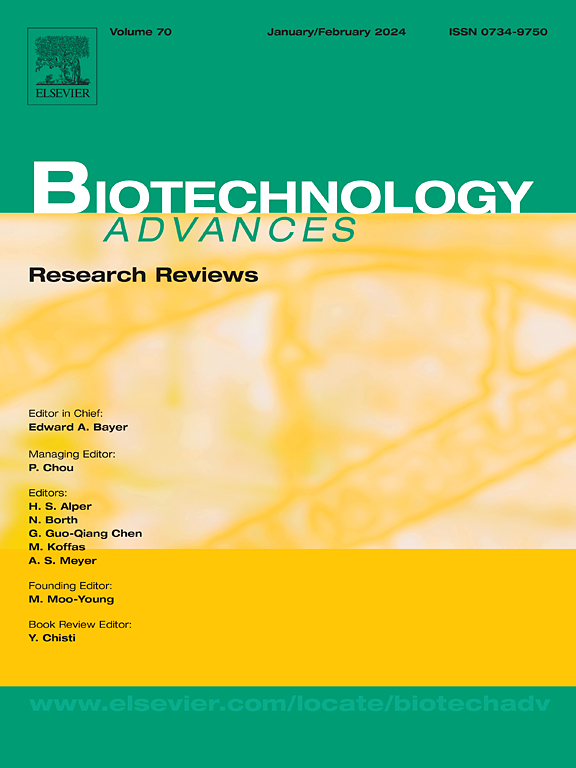Epigenetic therapy for leukemias: a comprehensive review from biological markers to practice
IF 12.5
1区 工程技术
Q1 BIOTECHNOLOGY & APPLIED MICROBIOLOGY
引用次数: 0
Abstract
Leukemia comprises a group of malignant clonal hematopoietic stem cell disorders where epigenetic abnormalities significantly contribute to its pathogenesis and progression. Epigenetic alterations, such as DNA methylation, histone modifications, and non-coding RNA dysregulation, affect gene expression and cellular function, driving leukemia development. In recent years, therapeutic strategies targeting these epigenetic abnormalities have emerged as a vibrant area of research. DNA methylation is one of the common epigenetic modifications in leukemia. DNA methyltransferase inhibitors (e.g., azidothymidine) are able to reverse aberrant DNA methylation patterns and reactivate silenced oncogenes, thereby inhibiting the proliferation of leukemia cells and inducing apoptosis. Histone acetylase inhibitors and histone methylase inhibitors regulate the acetylation and methylation status of histones, affecting gene expression and cell cycle progression. These drugs inhibit the malignant proliferation and induce differentiation or apoptosis of leukemia cells by altering their epigenetic state. In addition, non-coding RNAs play important roles in the epigenetic regulation of leukemia. By regulating the expression of non-coding RNAs, processes such as proliferation, differentiation and apoptosis of leukemia cells can be affected. In summary, epigenetic therapy for leukemia is a novel therapeutic approach with potential. By intervening against the epigenetic abnormalities of leukemia cells, it can inhibit their malignant proliferation and induce differentiation or apoptosis, thus providing better therapeutic options for leukemia patients. In the future, with the in-depth study of the epigenetic mechanism of leukemia and the development of novel epigenetic drugs, epigenetic therapy is expected to become one of the important means of leukemia treatment.
白血病的表观遗传治疗:从生物学标记到实践的综合综述
白血病包括一组恶性克隆造血干细胞疾病,其表观遗传异常显着促进其发病和进展。表观遗传改变,如DNA甲基化、组蛋白修饰和非编码RNA失调,影响基因表达和细胞功能,推动白血病的发展。近年来,针对这些表观遗传异常的治疗策略已成为一个充满活力的研究领域。DNA甲基化是白血病中常见的表观遗传修饰之一。DNA甲基转移酶抑制剂(例如,叠氮胸苷)能够逆转异常的DNA甲基化模式并重新激活沉默的癌基因,从而抑制白血病细胞的增殖并诱导细胞凋亡。组蛋白乙酰化酶抑制剂和组蛋白甲基化酶抑制剂调节组蛋白的乙酰化和甲基化状态,影响基因表达和细胞周期进程。这些药物通过改变白血病细胞的表观遗传状态,抑制白血病细胞的恶性增殖,诱导白血病细胞分化或凋亡。此外,非编码rna在白血病的表观遗传调控中也发挥着重要作用。通过调节非编码rna的表达,可以影响白血病细胞的增殖、分化和凋亡等过程。综上所述,表观遗传治疗白血病是一种具有潜力的新型治疗方法。通过干预白血病细胞的表观遗传异常,抑制白血病细胞的恶性增殖,诱导分化或凋亡,为白血病患者提供更好的治疗选择。未来,随着对白血病表观遗传机制的深入研究和新型表观遗传药物的开发,表观遗传治疗有望成为白血病治疗的重要手段之一。
本文章由计算机程序翻译,如有差异,请以英文原文为准。
求助全文
约1分钟内获得全文
求助全文
来源期刊

Biotechnology advances
工程技术-生物工程与应用微生物
CiteScore
25.50
自引率
2.50%
发文量
167
审稿时长
37 days
期刊介绍:
Biotechnology Advances is a comprehensive review journal that covers all aspects of the multidisciplinary field of biotechnology. The journal focuses on biotechnology principles and their applications in various industries, agriculture, medicine, environmental concerns, and regulatory issues. It publishes authoritative articles that highlight current developments and future trends in the field of biotechnology. The journal invites submissions of manuscripts that are relevant and appropriate. It targets a wide audience, including scientists, engineers, students, instructors, researchers, practitioners, managers, governments, and other stakeholders in the field. Additionally, special issues are published based on selected presentations from recent relevant conferences in collaboration with the organizations hosting those conferences.
 求助内容:
求助内容: 应助结果提醒方式:
应助结果提醒方式:


